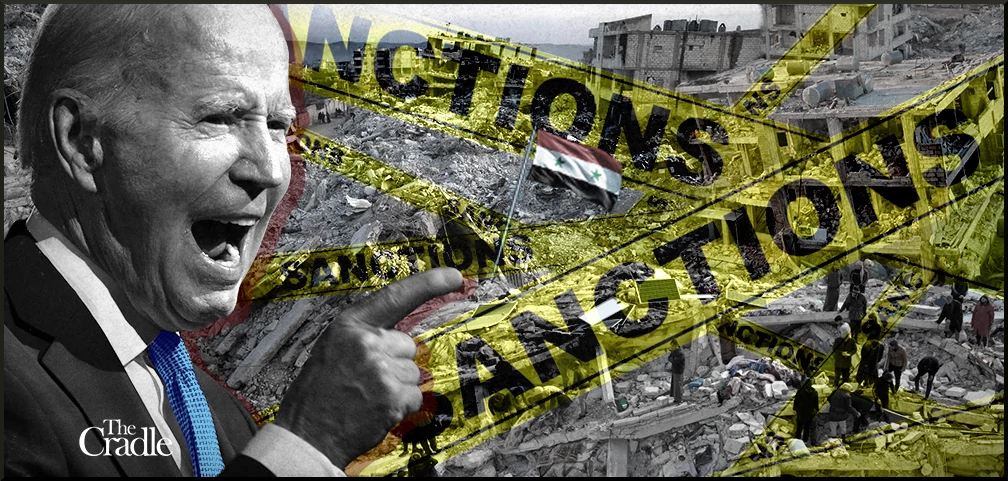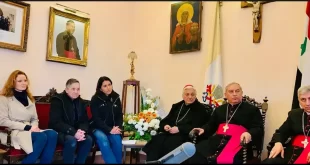by Georgio Cafiero and Alexander Langlois, published on The Cradle, March 6, 2023
The devastating earthquake that struck Syria and Turkiye in February has sparked a region wide conversation about the possibility of Arab states directly engaging with Damascus and bypassing the US sanctions that have crippled its economy.
Among the potential candidates capable of initiating a once-unthinkable move, the United Arab Emirates (UAE) stands out, mainly due to its considerable clout in Washington, which could be leveraged for sanctions exemptions – similar to concessions granted to India and Turkiye over Russian energy imports.
Under the leadership of President Mohammed bin Zayed (MbZ), Abu Dhabi has positioned itself as a key player in inter-Arab diplomacy. In recent years, the UAE has steadily worked toward ending the regional isolation of the government of Syrian President Bashar al Assad – more so than any other member of the Gulf Cooperation Council (GCC).
While the UAE has been lobbying for the reintegration of Damascus into the Arab League, its efforts gained momentum following last month’s calamitous earthquakes that claimed at least 50,000 lives in southern Turkiye and northern Syria.
Since reopening their diplomatic mission in Damascus in late 2018, the Emiratis have focused on building networks and engaging with the Syrian government, while Saudi Arabia has remained largely aligned with the west in supporting policies aimed at isolating Damascus.
However, there are now indications that Riyadh may be changing course on Syria following the earthquakes, a development that Abu Dhabi, Damascus, and Moscow would welcome, but which has not yet been embraced by any western capital.
Accepting the reality of Assad’s rule in Syria
At the Munich Security Conference last month, Saudi Foreign Minister Prince Faisal bin Farhan Al-Saud stated that the Arab region is moving towards a consensus against Syria’s isolation. He suggested that a dialogue with Assad’s government will be necessary “at some point” to address issues related to refugees and the humanitarian crises, adding that the current “status quo” is not sustainable.
As Dr. Annelle Sheline, a research fellow at the Washington-based Quincy Institute, explains the underpinnings of these comments to The Cradle:
“Riyadh may soon join other Arab states in normalizing relations with Damascus, a shift spearheaded by Abu Dhabi that predated the devastating earthquake. The UAE, and possibly Saudi Arabia, appear to have concluded that isolating Syria has only deepened its ties to Iran while failing to dislodge Assad, a counterproductive outcome.”
“In general, it has become obvious that international isolation is hurting the Syrian people while having little to no effect on the viability of the Assad regime,” she concludes.
Former US Ambassador to Qatar Patrick Theros tells The Cradle that Prince Faisal’s statement reflects how Riyadh’s “recognizes the reality that Assad survived and any threats to his staying in power have receded.”
“Further instability in Syria threatens Saudi interests. The jihadist/Al-Qaeda [Hayat Tahrir al-Sham] supported enclave in Idlib is on the ropes and Riyadh seems, perversely, to wish to strengthen ties with Moscow,” he added. Yet, as Theros points out, there is “not much Saudi affection for the Baathists.”
A rapprochement with the Al Saud rulers would constitute an enormous breakthrough for Damascus, and represent a significant development in the region. Put simply, for the Syrian government, rapprochement with Riyadh would be a grand prize.
“The Arab world has been moving slowly to end Syria’s isolation in recent years, and Assad’s visit to the UAE last year and now the Oman trip move the ball further down the field,” Ferial Saeed, a former senior US diplomat, tells The Cradle. “To get it across the goal line, however, requires Saudi support.”
Dareen Khalifa, a senior analyst at the International Crisis Group, agrees. She tells The Cradle that when it comes to Syria’s reintegration into the Arab region’s diplomatic fold, “the country that really matters is Saudi Arabia.”
Yet, the Arab League has consistently stated that a consensus among its member-states is necessary for Syria’s readmission to the pan-Arab body, which raises questions about potential spoilers, Qatar and/or Kuwait, obstructing this process. Syrian government officials would hope that Riyadh can persuade the Qataris and Kuwaitis to come on board with this emerging GCC consensus in favor of normalization with Damascus. Thus, while Syrian officialdom will not forget Saudi Arabia’s material and logistical support for extremist militias during the war, Damascus understands the important role that Riyadh has to play in Syria’s return to the Arab region’s diplomatic fold.
However, not all experts expect the Saudis to necessarily be on the verge of formally reconciling with Damascus. “Rather than suggesting that the Kingdom of Saudi Arabia re-recognize [Syria’s government], the idea sounds more like a diplomatic channel as some used to communicate with Iran and which would be activated per crises points,” says Dr. Sherifa Zuhur, director of the Institute of Middle Eastern, Islamic and Strategic Studies, when discussing the Saudi foreign minister’s comments in an interview with The Cradle.
Carving out autonomous policies on Syria
It is important to view any potential Saudi shift on Damascus within the broader context of a gradually emerging consensus toward Syria among GCC member states, with the exception of Kuwait and Qatar. Assad’s visit to Oman on 20 February, eleven months after he visited Abu Dhabi and Dubai, indicates that the Persian Gulf’s Arab monarchies have warmed up to the idea.
Additionally, a parliamentary delegation, consisting of Egyptian, Emirati, Iraqi, Jordanian, Lebanese, Libyan, Omani, and Palestinian representatives, visited Damascus on 26 February to meet with Assad and other officials in his government, underscoring efforts to secure Syria’s reintegration into the Arab world’s diplomatic fold.
Nonetheless, Saudi and Qatari officials reportedly refused to meet with Syrian officials when the delegation was in Iraq just before arriving in Damascus.
Ultimately, such diplomatic engagements signal that many officials in Arab states share the view that US policy towards Syria has been a failure and that their governments should pursue independent strategies to advance their national interests in Syria, which they believe will not be served by Assad’s continued isolation.
Former US diplomat Saeed highlights how a regional shift towards pragmatism is presenting itself in Syria today:
“The regime controls most of the country and is likely to remain in power, and while Washington was crucial to defeating ISIS, its policies have not brought stability and an inclusive political order to Syria, checked Iranian and Russian influence, or deterred Assad from [allegedly] using chemical weapons against his people, as previously advertised.”
“These outcomes have lowered expectations of what Washington can achieve and caused GCC states to question the value of continuing Syria’s isolation. The status quo poses political and security dilemmas for GCC states. Now that an Iran nuclear deal and the potential for Iranian rapprochement with the West are off the table, they are focusing on repairing relations with Damascus to mitigate Iranian influence,” she continues.
According to Saeed, regional actors’ growing diplomatic engagement with Damascus is not so much about “rehabilitating” Assad, but more about coming to terms with the reality of him maintaining power. This policy shift is largely based on “bringing the Syrian state back into the Arab fold in response to changed realities on the ground,” explains the former US diplomat.
It is important to note that both Saudi Arabia and the UAE view the Syrian state as being weaker than ever – and particularly vulnerable at this juncture due to severe economic setbacks. Consequently, Riyadh and Abu Dhabi view “earthquake diplomacy” as an opportunity to pressure Assad into making concessions that could serve Riyadh and Abu Dhabi’s interests – ones they may not have considered before.
These concessions heavily focus on limiting or reversing Iran’s significant influence in Syria. The two GCC powerhouses have both the financial resources to help Syria, and the leverage in Washington to see their plan through. Officials in some GCC states such as the UAE believe that engaging Damascus could gain them greater clout in the war-torn country at the expense of Iran’s influence – although to what extent is debatable.
Sanctions are stumbling blocks
US sanctions, specifically the Caesar Act, will force GCC states to approach Syria cautiously. These Trump-era sanctions, which the Biden administration has kept in place, come with secondary sanctions, and US-friendly states in the Arab world have not had many trade, investment, or business dealings with Syria as a result.
US and EU-imposed sanctions on Syria are likely to stay in effect for the foreseeable future. Most Western governments will continue treating Assad’s government as a pariah state regardless of the regional thawing. From the perspective of GCC states such as the UAE, this reality means that participating in Syria’s reconstruction and redevelopment risk sanctions harm by dealing too deeply with Damascus.
The UAE’s approach personifies this difficult reality, notes Khalifa, who believes the Caesar Act will do much to prevent the UAE from taking too many risks in Syria. “So far, we’ve only seen diplomatic and political restoration of relations – we haven’t seen that manifest into any economic support to the country or regime. I doubt that is going to happen anytime soon because of the chilling effect of US sanctions.”
Thus, with the Biden administration pressured into lifting some financial sanctions related to the earthquake response for a six-month period via General License No. 23 in order to facilitate humanitarian assistance to Syria, the major question today is whether Saudi Arabia and/or the UAE will halt their dealings with Damascus after this exemption expires. Of equal importance is whether they will work to permanently sideline them.
This raises the possibility of a divergence between Riyadh and Abu Dhabi’s approaches to the Caesar Act and Syria’s future. It’s easy to imagine the Saudis pursuing less of an active agenda than the Emiratis, who retain significant influence and maneuverability in Washington.
Previous controversial policies by Abu Dhabi are notable given they did not receive significant backlash from the United States – lessons in restraint Washington has possibly learned from its miscalculated threats against Riyadh. This flexibility likely comes courtesy of the UAE being the Arab driving force behind the Abraham Accords.
As a small and wealthy Arab state with an agile foreign policy seeking to further consolidate its dominant role in inter-Arab diplomacy, the UAE will likely continue playing its unique cards to try to further shore up the government in Damascus and reintegrate Syria into the region’s diplomatic fold. But whether Abu Dhabi can lead the charge to bust US sanctions, drive reconstruction and investment, and lift Syria from its economic morass is another question.
Editor’s note: Interesting analysis. It is true and good that the Gulf states are beginning to look to their own interests rather than U.S. interests in the region. At the same time, the secondary sanctions in the Caesar Act are the U.S. way of enforcing U.S. interests around Syria. The likelihood of Syria abandoning the Axis of Resistance for the GCC is slim to none. Moreover, reference to General License 23 would lead one to think that it really changes any thing, though, in practice, it does not. Surely the Saudis and Emeratis know that. Unless they have a sense that they will be privileged by the U.S., any economic interaction with Syria will reflect how much distance from the U.S. they are prepared to accept, and perhaps, whether they are ready to move their center to the emerging leadership of the multipolar world. [jb]
Giorgio Cafiero is the CEO and founder of Gulf State Analytics, a geopolitical risk consultancy based in Washington, DC.
Alexander Langlois is a foreign policy analyst focused on human rights, diplomacy, peace, and conflict in the Middle East and North Africa. His research is particularly concentrated on Syria, Lebanon, and Yemen
 Syria Support Movement solidarity with the Syrian people
Syria Support Movement solidarity with the Syrian people





